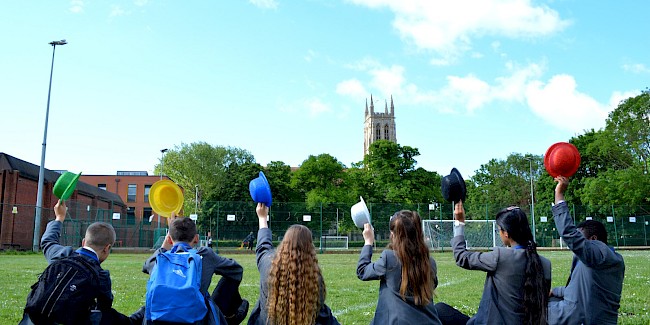Further Education College
Further education (abbreviated to FE) includes any study after secondary education that’s not part of higher education (that is, not taken as part of an undergraduate or graduate degree).
FE colleges offer a much wider range of courses ranging from GCSE’S, A Levels, BTECS to Higher National Diplomas (HNDs) and the new T-Levels. Courses like T Levels or BTEC allow you to focus on a chosen career area like construction, healthcare science or digital careers. Some careers may ask for specific qualifications, so always do some research into where the course you are interested in might lead.
Qualifications Levels
Level 1 qualifications are fairly basic, building confidence and providing an introduction to a subject, industry or area of work. They include, for example, NVQ Level 1, BTEC Introductory Certificates and OCR Nationals which are roughly equivalent to GCSEs gained at grades 1 to 3. You will need qualifications at this level before progressing to level 2.
Level 2 qualifications give a deeper understanding of a subject or area of work. They include, for example, NVQ level 2 and BTEC First. They are roughly equivalent to GCSEs at grades 4 to 9. Many employers like young people to have a Level 2 qualification as a minimum.
Level 3 qualifications include A and AS-levels, NVQ Level 3, BTEC Nationals, Advanced and Progression Diplomas. This level is almost always required for entry to university and many employers will be looking for Level 3 in applicants for more technical or supervisory roles.
Levels 4 to 8 may also be available in your local college but are classed as ‘higher’ rather than ‘further’ education. They include Foundation degrees, HND/HNC courses, Honours degrees and postgraduate or professional qualifications at a high level.
Not all colleges, however, will offer the same variety of subjects and courses, so it’s very important to check carefully what is available locally.
A-Levels
- Description: Study a subject you took at GCSE in greater depth or choose a new one like economics, law or psychology. You could take 3 broad subjects you are interested in to keep your career options open or choose ones you need for a specific career.
- Duration: 2 years.
- Assessment: Mostly exams at the end of the course.
- Level of study: 3.
- Entry requirements: Course dependent, typically 5 GCSEs Grade 9-4 (usually including English and maths).
- Work experience: Usually 1 week during year 12.
- Leads to: University/college, higher and degree apprenticeships, work.
T-Levels
- Description: Designed in partnership with employers to give you the skills and knowledge to get on in the workplace. You'll combine classroom learning with real work placements. 1 T Level is the equivalent of 3 A levels.
- Duration: 2 years
- Assessment: Exams, projects and practical assignments
- Level of study: 3
- Entry requirements: Course dependent
- Work experience: At least 45 days on industry placement
- Leads to: Work, higher and degree apprenticeships, college and university courses
- Find out more: Gov.uk information about T Levels
Vocational and technical qualifications
- Description: These courses teach you the practical skills and knowledge for a particular area of employment. They can prepare you for a broad employment sector, like engineering or travel and tourism, or for a specific job like a chef or a hairdresser. Qualifications which teach you how to do tasks specifically related to the industry and role you want to be involved in.
- Duration: 1 or more years
- Assessment: Can include coursework, skills tests and exams
- Level of study: 1+
- Entry requirements: Course dependent
- Work experience: You'll learn in real situations in college, for example in a college restaurant or a salon that is open to the public. You may also have the chance to go out on a work placement with an employer.
- Leads to: Apprenticeship, work, college or university
- Find out more: Speak to your local college or training provider or talk to an adviser
Applied qualifications
- Description: Qualifications that give you a broad overview of working in a specific sector, like business, media, engineering, leisure or science and technology. A mix of classroom-based learning with the chance to get some practical skills.
- Duration: Course dependent
- Assessment: Course dependent (coursework and exams)
- Level of study: 3
- Entry requirements: Course dependent
- Work experience: Course dependent
- Leads to: University/college, apprenticeship, work
- Find out more: Gov.uk information about applied qualifications
Other opportunities
You could look at what work and study options will be available to you at 18.
You could also consider volunteering to strengthen your job and study opportunities.
Exam retakes
- Description: If you didn't get the results you wanted, you can resit some of your courses or sign up for some new qualifications.
- Location: School sixth form, sixth form college or further education college
- Duration: 1 year
- Entry requirements: 16+
- Qualifications: Level 2 and 3 qualifications like GCSE, A level and BTEC
- Leads to: Higher level or degree apprenticeship, further education, higher education, work
- Find out more: Speak to your school or college careers leader or careers adviser or our careers advisers
